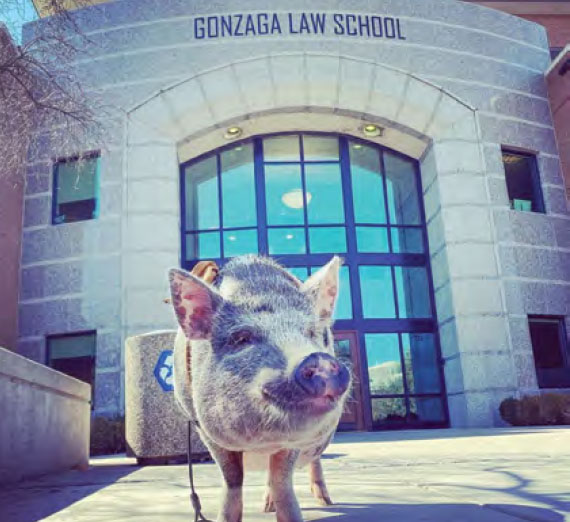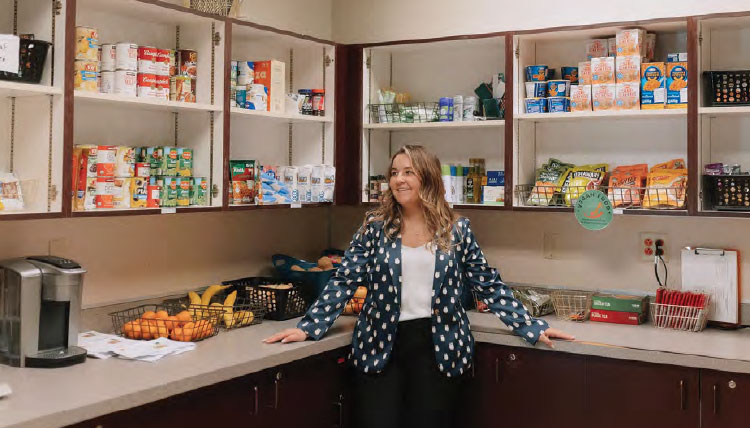Health and Wellness: Affirming Students' Goodness

Since the pandemic, discussions about mental health, especially among the nation’s young people, have taken on greater urgency.
A November 2022 article in Psychology Today pointed out that half of all young adults ages 18-24 reported experiencing moderate to severe depression. It’s an alarming figure that has educators, policymakers and health care professionals talking about how to best handle the crisis.
At the Gonzaga University School of Law, there’s an old philosophy, rooted in the school’s Jesuit tradition, serving as a framework: cura personalis, or “care for the whole person.”
Cura personalis shows up in several ways on campus, from the launch of a student-run food pantry and visits from a therapy pig to making sure students are equipped with the tools that will help them manage the stressors in their academic and professional lives. It also shows up in the growing number of programs and resources aimed at helping students not only survive but thrive in their law school years, and in helping them stay healthy in mind, body and spirit.
Mind
In spring 2020, with the pandemic creating much uncertainty in the world, Susan Lee took on the newly created full-time role of dean of students of Gonzaga Law; for many years, the role had been only part time.
“I think the Dean (Jacob Rooksby) saw that as a real need; we need a person who can really care for our students in more of a holistic way,” she said. “I view my role as the facilitator to get them what they need, to help them succeed while they’re going to school.”
In practice, that means working with students directly, finding out what help they need and how to best get it for them. It also means having the resources readily available.
“Say we have a student who is having a really hard time,” Lee said. “They might need some spiritual guidance, so I might say Fr. (Bryan) Pham is a great person to talk to. We might find out they have had some kind of accommodation, or might need one, so I help them establish a relationship with our Disability Access Office. Or they might need counseling. Oftentimes we sit in my office and I make the phone call and have the student with me.”
Her work also involves helping students make connections and cut loose occasionally to relieve stress. Activities include movie night at the Garland Theater (where the bar next door serves a “Subpoena Colada”), monthly visits with therapy dogs and a pig, monthly socials, and a yearly petting zoo.
“It’s important to feel part of a community,” Lee said. “That’s the biggest piece I hear from our students is they’re so grateful for these small touches. Not any one thing is huge, but I do think they do add up.”
Laurie Powers, GU Law assistant dean for professional development, said part of her work is helping students figure out their own professional identity. In the school’s externship program, students take a reflexive seminar in which each class begins with a short mindfulness exercise.
“It’s part of us teaching you things to have in your tool kit, because whether it’s finals, the bar exam or a tough case you get, there are going to be times when you need to center yourself,” Powers said.
Body
Students have access to an on-campus gym as well as an off-campus site for physical exercise. What was missing was easy access to fuel for students who needed it. So in April 2022, the law Student Bar Association opened a food pantry in a small space in their office, using money from the SBA budget.
In February 2023, the pantry moved to a permanent larger space on the third floor with the support of the Law School’s administration and generous donors. The larger space allows for perishable and nonperishable items thanks to a new industrial grade refrigerator.
The food pantry became an obvious need when students shared about financial stressors. Lee said, “A big part of it might be that they don’t have breakfast for themselves or a snack for their kiddo, and trying to meet those basic needs.” Mariah Welch (’23 J.D.) had experience in starting a food pantry while in student government at the University of Montana during her undergraduate years.

When the Student Bar Association did a student survey during the 2021-22 school year to determine if there was a need, “We got a resounding ‘Yes’ that students would want this or need this,” Welch said. “A lot of students at the Law School were going without nutritious meals because they couldn’t afford to have them.”
They also teamed with Second Harvest, the Spokane regional food bank, to bring a mobile market to Gonzaga once a month to feed students; any leftover food would go in the pantry, Welch said.The pantry stocks canned goods, snacks, lentil and rice packets, eggs, butter, yogurts, cheese sticks as well as fresh fruit and vegetables. In the 2022-23 academic year, students checked into the food pantry more than 6,000 times, noted Welch.
“We hear students say they maybe haven’t had fresh fruits or veggies all semester because they couldn’t afford it, except for the food pantry,” she said. “We’ve heard a lot of students say this is the best thing Gonzaga has ever done to show support for students.”
Welch added, “It’s humbling and makes me really proud that students are willing to accept that help and that we’re able to give it to them.”
Spirit
Fr. Bryan Pham, S.J., J.D., Law School chaplain, undergrad professor and pre-law adviser, said the school strives to begin “caring for the person” even before a student applies.
“Our commitment to cura personalis doesn’t begin when they first step on campus. It starts when they are calling our admissions office, looking at our website to see if this is what they want to do,” he said. “How we respond should be a way that affirms them in their goodness.” It’s about making sure that Gonzaga Law fits the student’s goals and expectations. It’s about making sure they’re going to find community on campus. It’s about affirming their humanity.
“It’s how do we honor you as a person,” he said.
Father Pham is among those involved in screening applications. He doesn’t think of it as administration. It’s ministry.
“When I look at the application ... I’m reading a journey, I’m reading a story, I’m reading a history of someone. And yeah, it’s statistics. It’s their grades, GPA, the LSAT scores, but I’m also reading the personal statement, the letters of recommendation,” he said.
Once those students are on campus, “Our job is to help them grow. Yes, it’s about becoming the most competent, moral, ethical attorney possible,” Pham said, “but they also grow as people. ... It’s letting them know there are spaces here on campus where they can be themselves, where they can share the deepest joy but also the deepest anxiety. We do that from a faith perspective, we do that from an emotional perspective, we do that from a professional perspective.”
“How we respond should be a way that affirms them in their goodness.”
